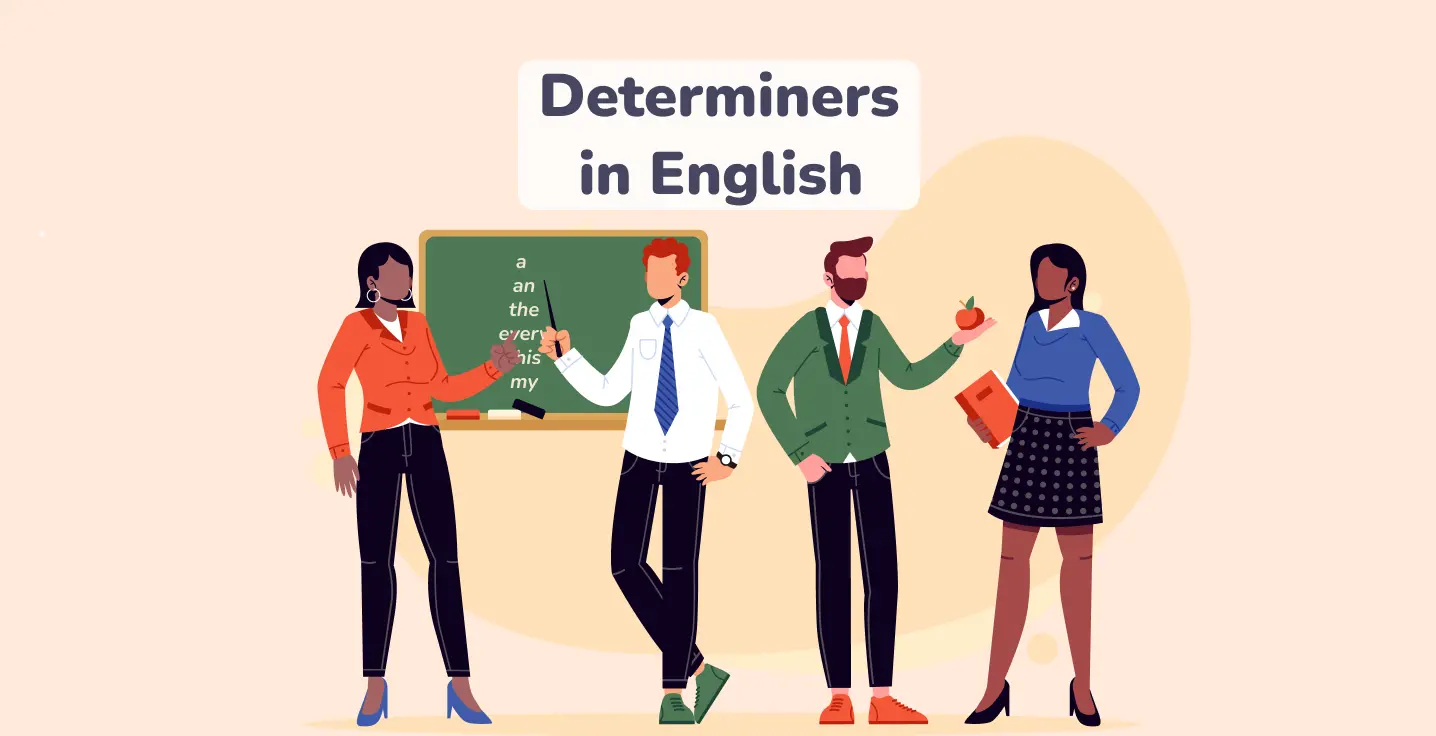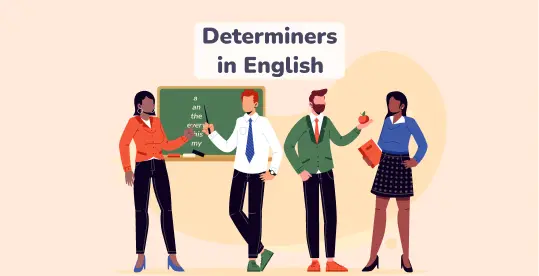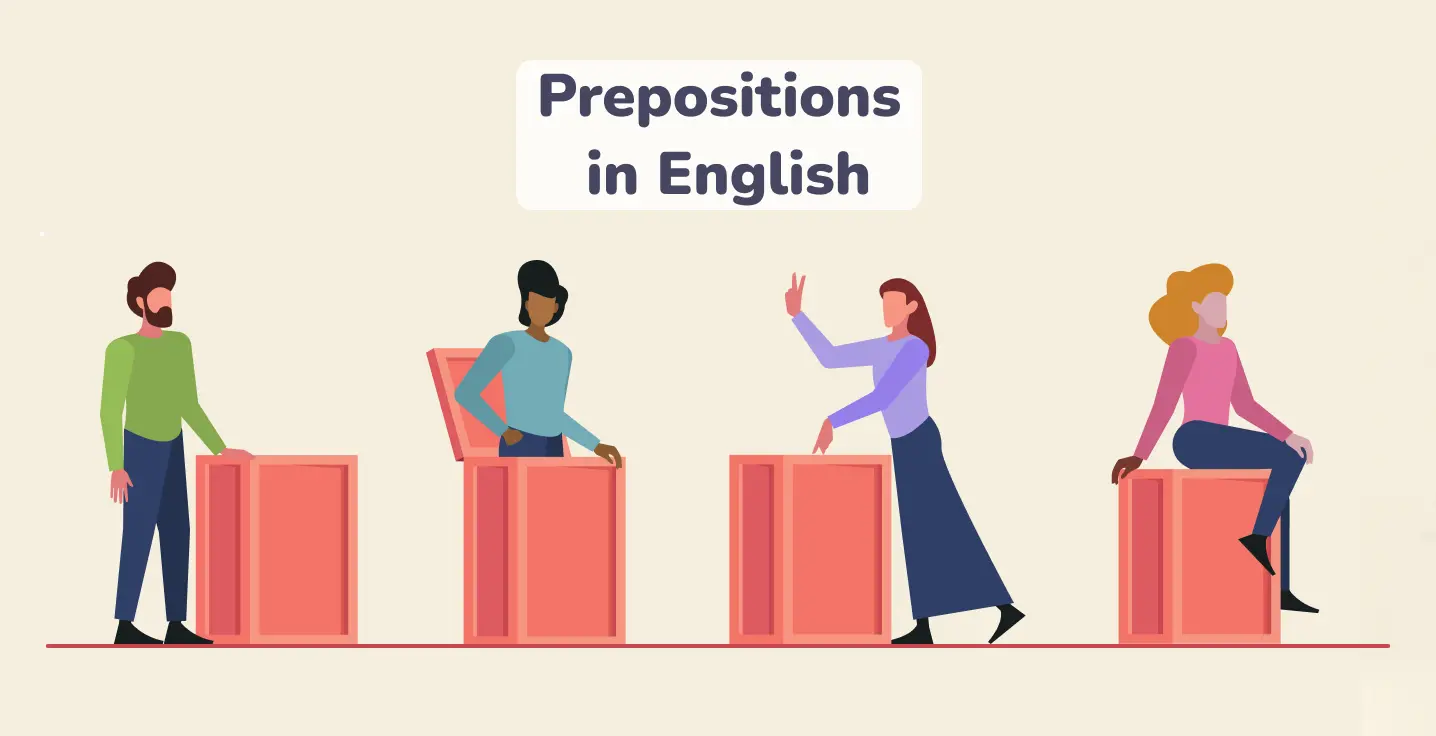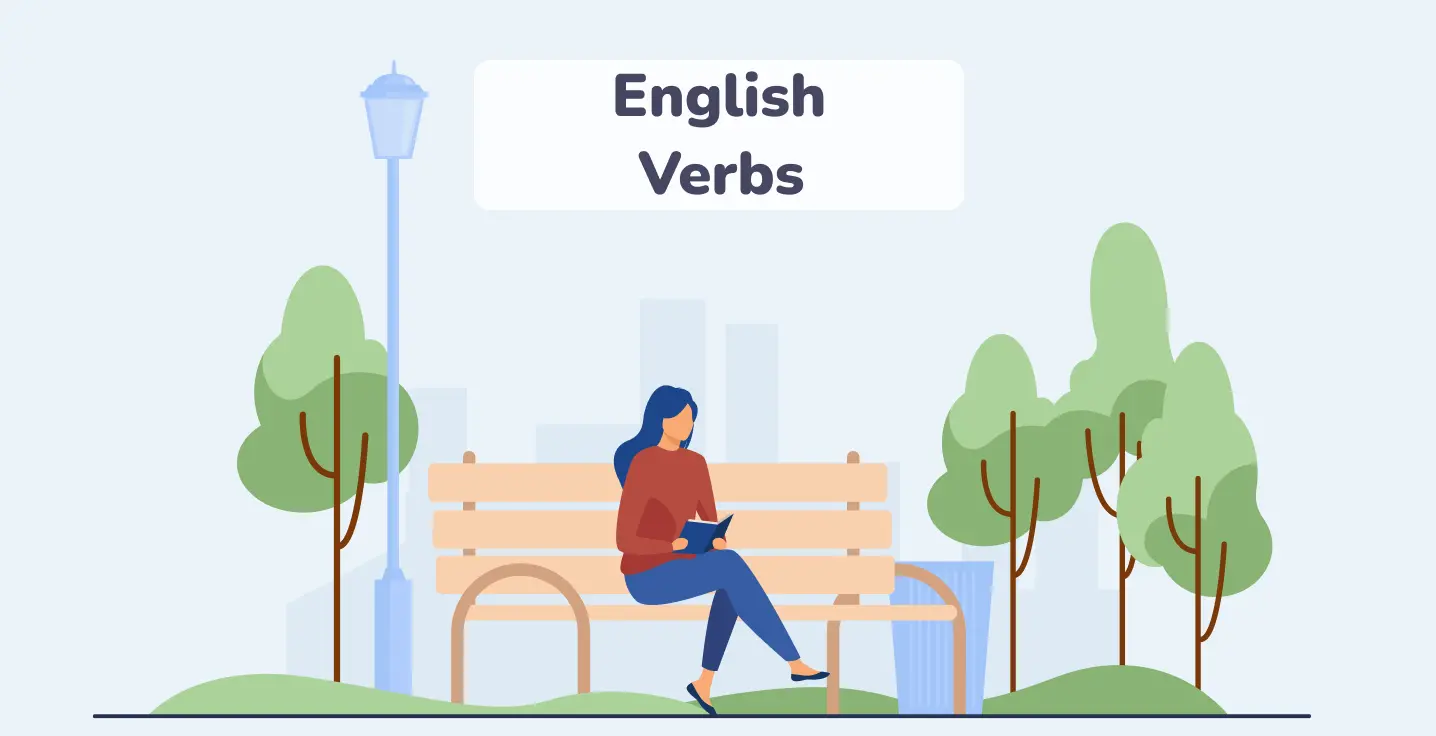What is a determiner?
A determiner indicates a noun in a sentence, showcasing some details that help people perceive more information and specifications, like how many, whose staff it is, which concrete thing, and so on.
Determiners in English are irreplaceable if you would like to make your language more natural and bring more specificity to your texts or speaking. The best way to demonstrate this case is to get a sample:
With these specific words, you receive more than just general information about what was bought, for what reason, and even the location.
As we define the answer to the question, “What is a determiner in grammar?”, we need to address the confusion of its differentiation from adjectives, as they seem to be similar. We will keep it simple and say that you can say where an adjective is by its position — it is always placed after a determiner.
Another moment to remember is about the fact that adjectives describe the qualities of something or someone, while determiners are the opposite.
Level up your English with Koto!
Types of determiners
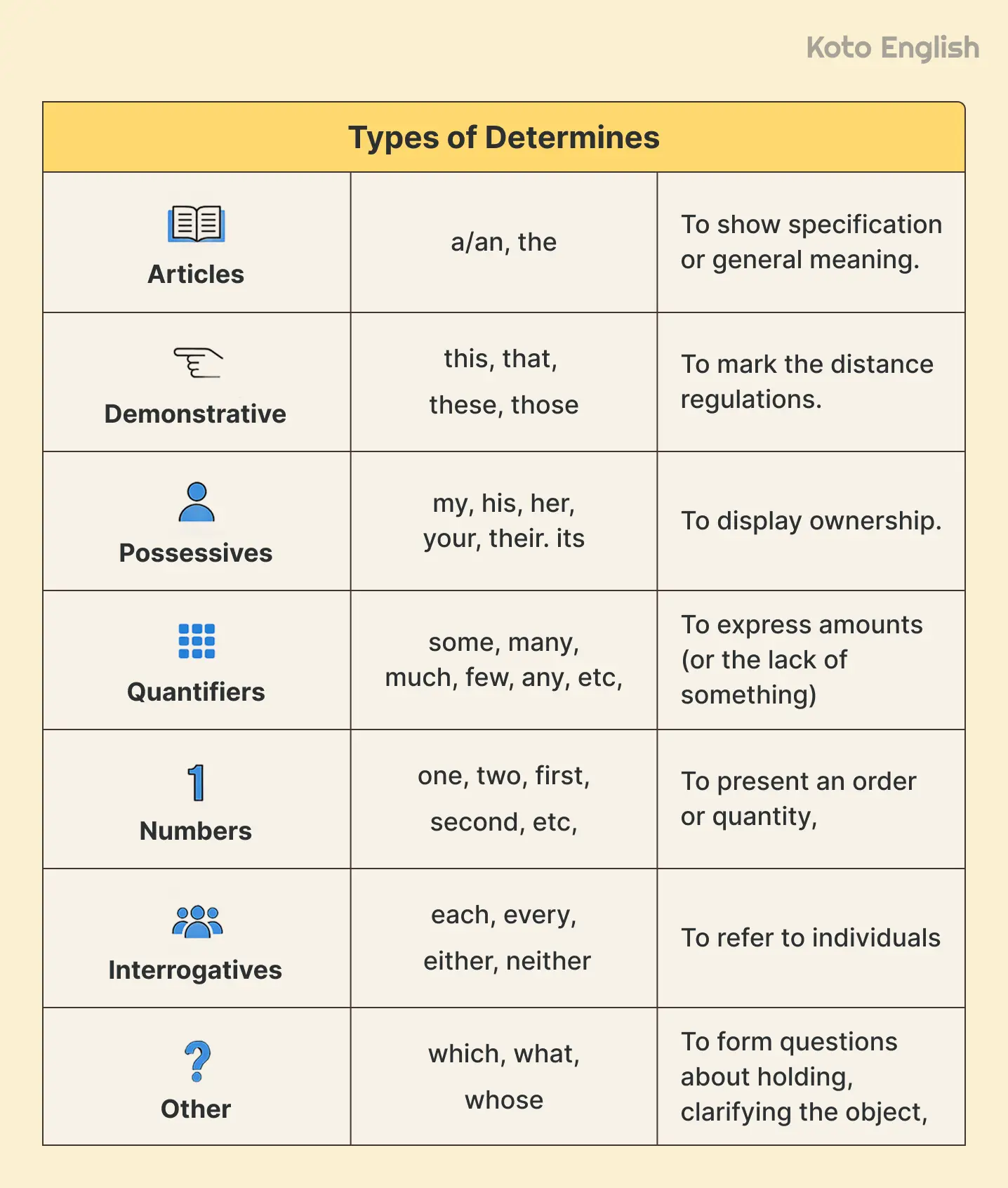
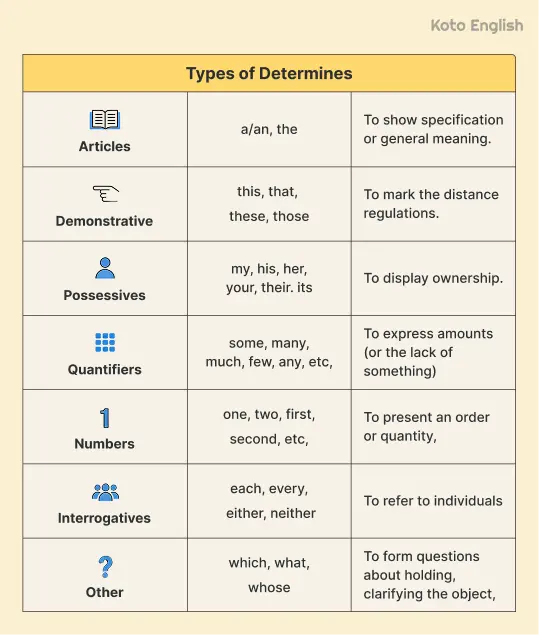
To make your English skills more precise, you have to learn about all kinds of this specific term, which is more than the determiner definition. They allow you to bring more information into each sentence, show possession, the essentiality of quantities, and so on.
Here is a complete table for more understanding, with real-life usage of each type.
Overview of determiner categories
With a detailed breakdown of these word blocks, you will be able to study them easily, even though this topic seems challenging for new learners. Let’s move right to the sections!
| Type | Determiners | Function |
|---|---|---|
| Articles | a/an, the | To show specification or general meaning. |
| Demonstrative | this, that, these, those | To mark the distance regulations. |
| Possessives | my, his, her, your, their, its | To display ownership. |
| Quantifiers | some, many, much, few, any, etc. | To express amounts (or the lack of something). |
| Numbers | one, two, first, second, etc. | To present an order or quantity. |
| Distributives | each, every, either, neither | To refer to individuals. |
| Interrogatives | which, what, whose | To form questions about holding, clarifying the object. |
| Others | such, another, etc. | To demonstrate other specifications. |
Such a table is easy to maintain and learn, though, but you definitely need some samples that you can find in daily communication, books, online newspapers, series, and more. Let’s research the kinds we outlined above that will help you to learn English faster.
Exploring the main groups
A small guide will make the difference between memorizing automatically and actually understanding the concept of a list of determiners, so you will find it below.
Articles allow you to identify whether you are talking about specific or general items or people. If you need to point out that this particular thing has something to do with you, you need to use the, and in other cases — a/an.
Example:
- Demonstratives are connected to their name as you can use them for pointing out a number or distance.
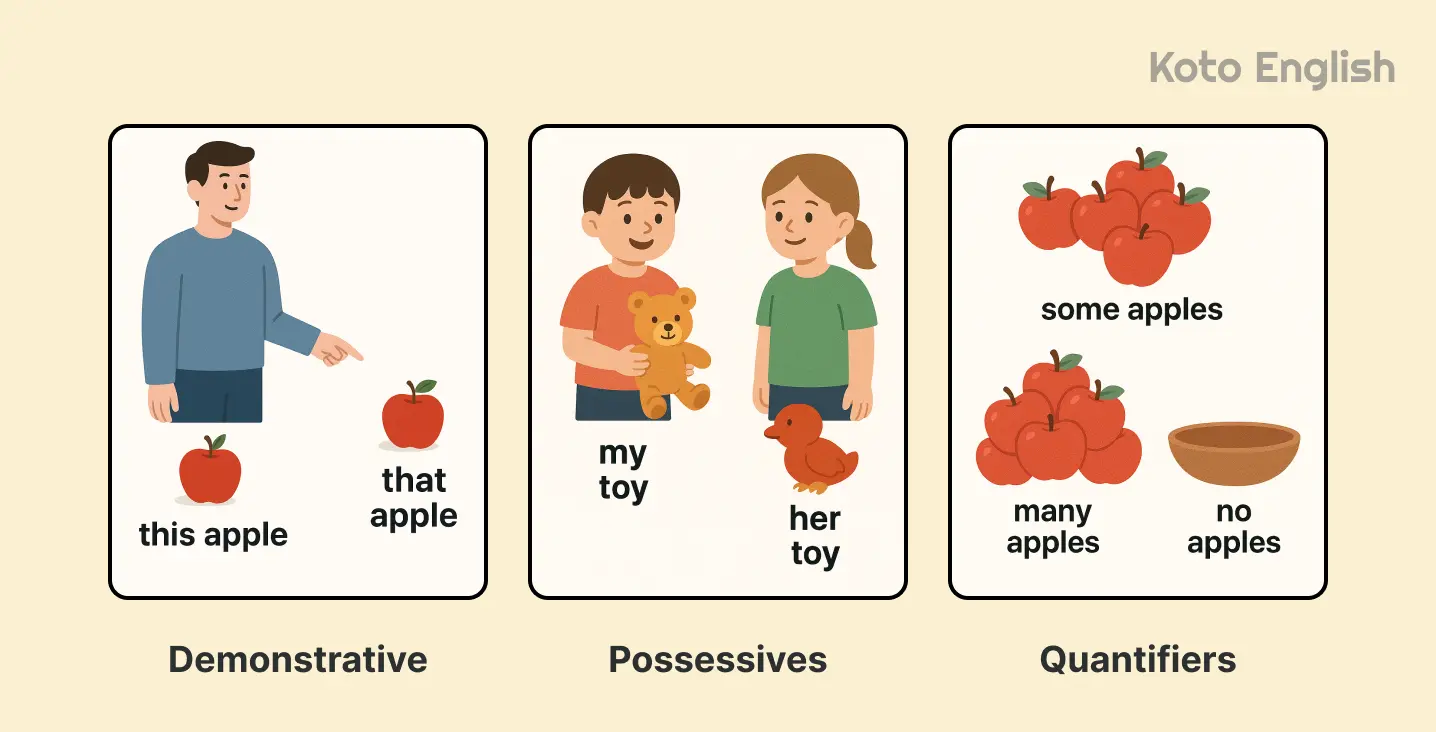
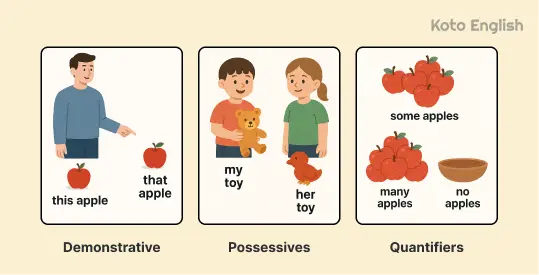
Example:
- Possessives can be used to tell about relationships between people (not only lovers but family as well), and speak about what belongs to whom.
Example:
- Quantifiers are all about the amount of something, whether you use countable or uncountable nouns, which makes them more convenient.
Example:
- Interrogatives make questions more straightforward and bring some information to the text or speaking.
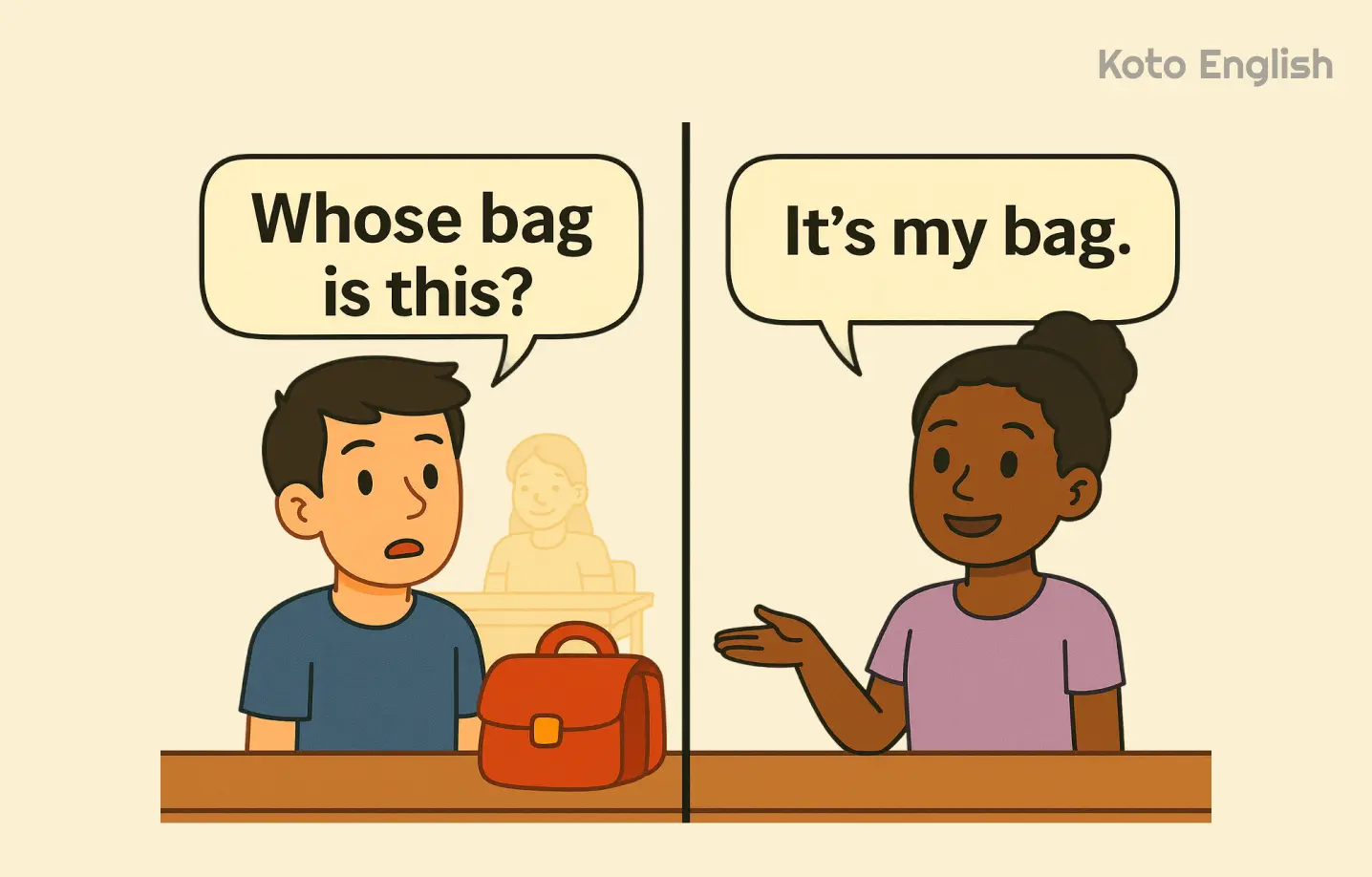
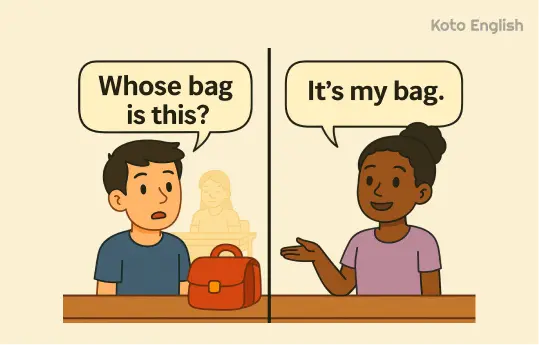
Example:
- Distributives are also used for people, animals, options, and so on to point out some specific information.
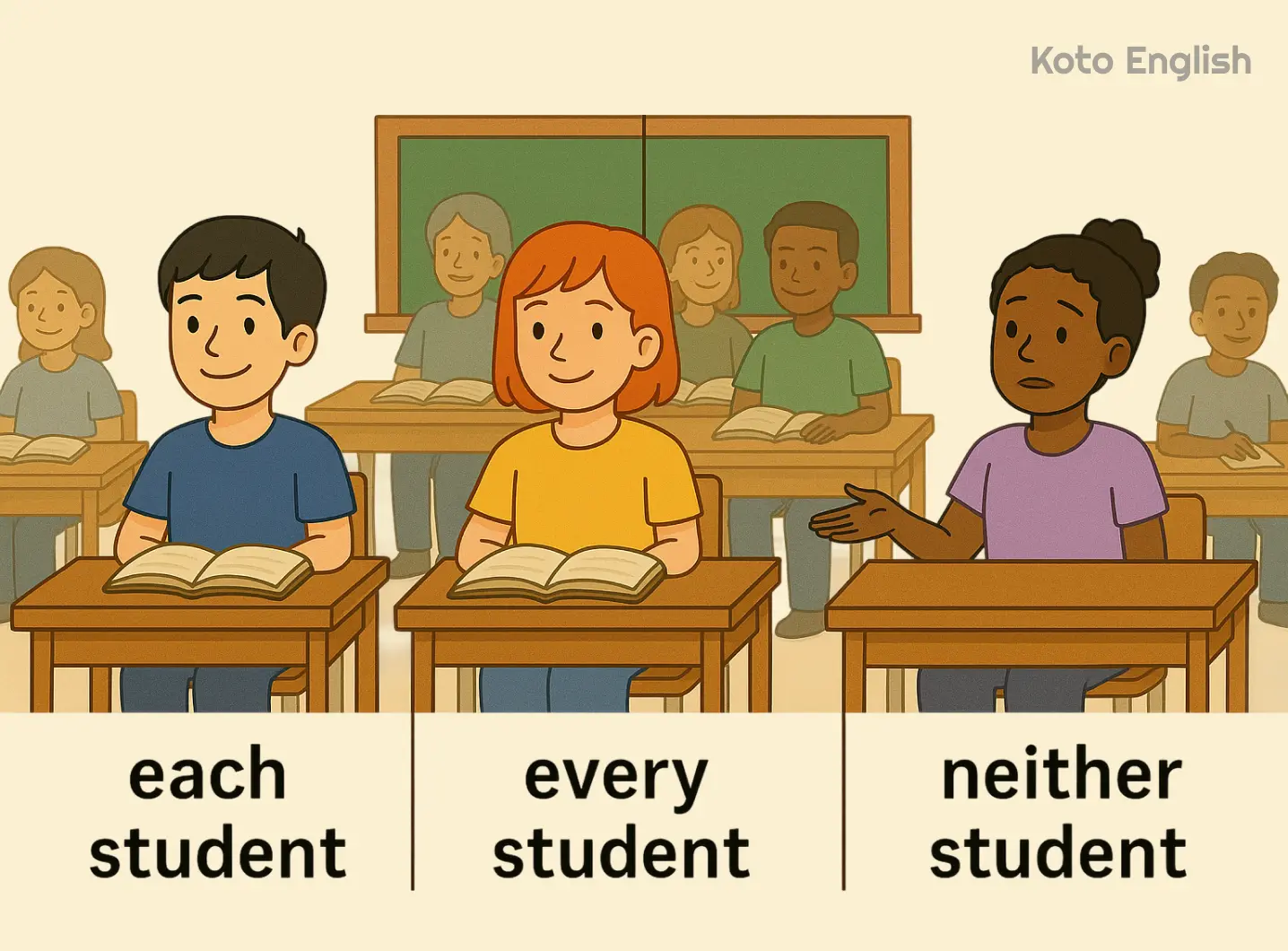
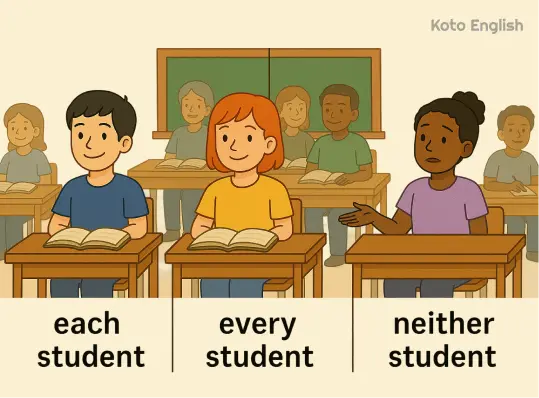
Example:
You have become more fluent in English as you learned the basics of types of determiners, and you just need to familiarize yourself with the proper usage and get some practice. Let’s jump right into the next section for you to gain more knowledge.
How to use determiners in sentences?
We have a simple answer from our methodologists, and they say, “Just put a determiner before a noun or a phrase.” Well, it is really a core rule, but English wouldn’t be English if it didn’t have some specific exceptions and confusing nuances. That’s why we will consider them today in this piece of the article.
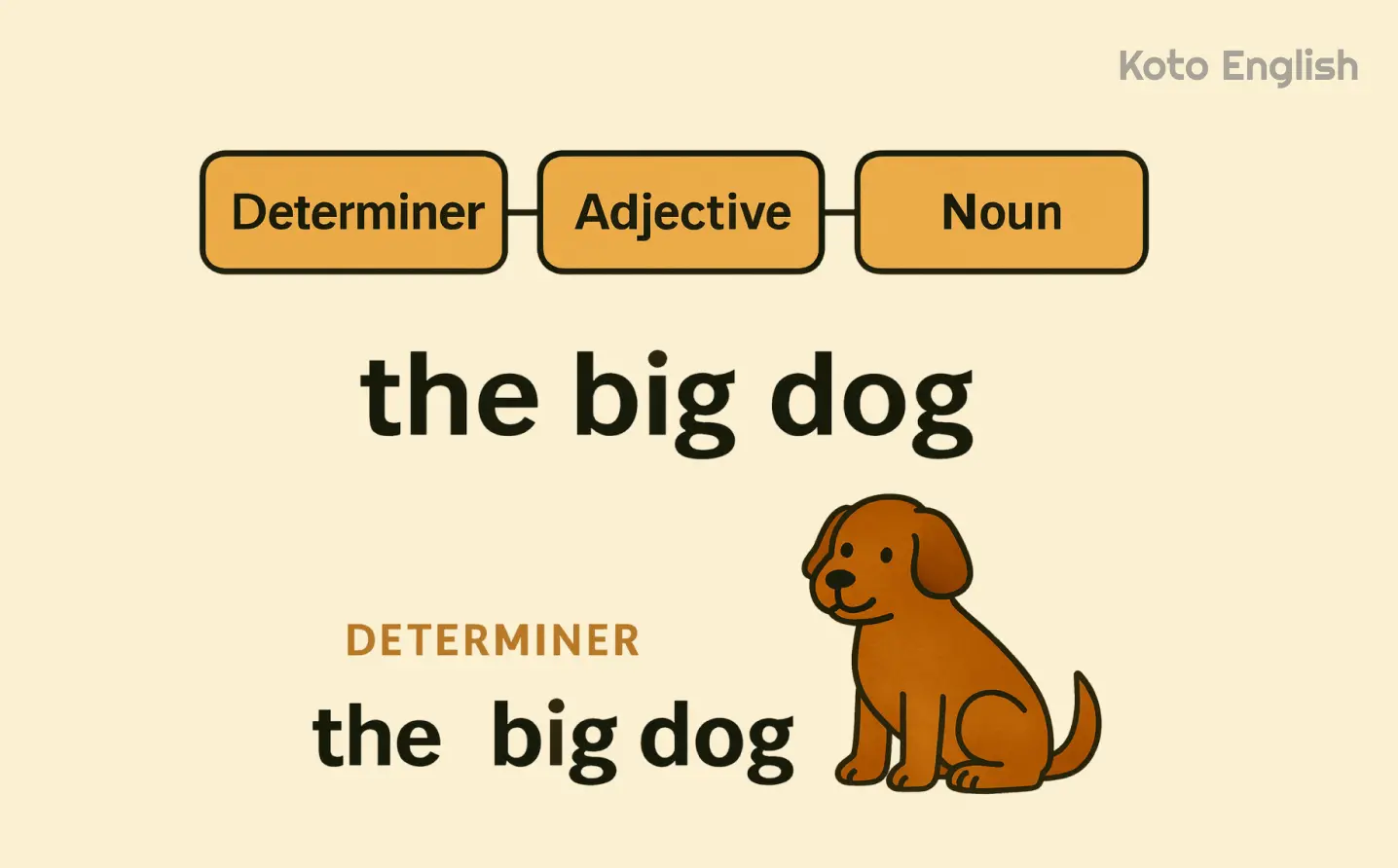
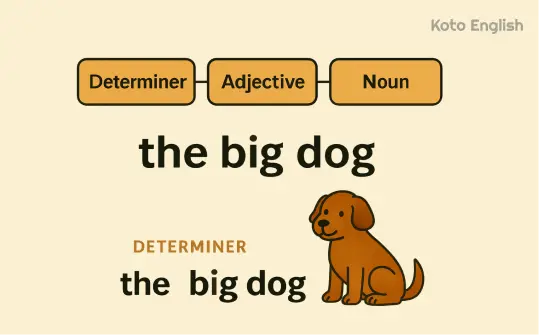
-
Place it before a noun and adjective
The crucial and fundamental rule for singular and plural nouns, countable and uncountable nouns as well. You use it to provide another person with more information about the noun of the sentence, clarify when needed, and make your English clearer. Here are some determiners examples:
I rode a bicycle, andthe dogs nearthe supermarket barked at me.She said thateach student in her class participated inthe group project.Wow,this brand new watch looks good on you. -
Write a/an for non-specific nouns in singular
This is one of the most confusing parts of English grammar, as learners can’t define where to use a and an (of course, because there are some exceptions), so here is a simple tip — you write a when a word starts with a consonant, and an for vowels. Now, let’s see how it works in practice with a nuance:
I sawa movie on Netflix.I was listening to my Spotify playlist foran hour.She needs to scroll a TikTok foran hour before sleep.In the second sentence, you can see the usage of an with hour, and the explanation says that h here is too silent, we almost can not hear it, and it feels like it starts with a vowel.
-
Put the for certain nouns
You answered the question, “What are determiners?”, so you need to study this specific rule as well because it makes your sentences more unique and understandable. First of all, you need to use this term when talking or writing about something that is well-known to the listener/reader.
He joined a Zoom call.The call was long but worked out well.Let’s meet at a metro station.The metro station is located near my house.Secondly, you implement this word when talking about some unique things, like the Sun, the first woman ever, and so on.
Usage notes and exceptions
Grammatical statements without exceptions would be quite easy to learn and even boring, right? Luckily, we gathered together all the cases that take place in this topic for your convenience. Let’s check them:
- No articles for uncountable nouns like music, and organizations like: Every child goes
to school . - Any can be used for positive as well when you are talking about something that has no specification. For example, you need to schedule a call with your colleague, and you say any time meaning you can call when you have an opportunity.
- Double English determiners can be used in some situations, like combining many and the for:
Many ofthe kids in my school have smartphones.
Understanding this concept will make you more confident in daily and specific communication, so it is advisable to practice more, with enjoyable tools like Koto English.
Common pitfalls to avoid
You have gained knowledge about determiners’ meaning, so it is time to dive deeper and learn about typical mistakes that are made by all types of students — from beginners to those who are preparing for C2 certification exams.
That’s why today you will be aware of errors to avoid with their solutions and detailed reviews. Let’s start with the most popular one.
Overusing determiners
When learning about this concept, speakers can think that it is necessary to add them to every noun and object in a sentence, even if there is one, because they have to provide more details.
|
I need the my headphones for this trip.
|
I need my headphones for this trip.
|
|
You can check the your balance online.
|
You can check your balance online.
|
Messing up determiners with pronouns and adjectives
We answered the core question, “What are determiners in grammar?” So now, it will be nice to check the mistakes that take place in confusing it with other parts of speech.
Why does this happen? — Because this, that, each and others can be pronouns and determiners, so you need to pay attention to the sentence structure and context to make it right, as well as remember that a determiner comes before a noun.
|
Each is teacher is hardworking.
|
Each teacher is hardworking.
|
|
I got these blue.
|
I got these blue notebooks.
|
Confusing “any” and “some”
This concept is common as well because the terms sound similar and seem to be interchangeable, causing many errors in tests. To get to the point of their correct usage, you need to remember that any refers to negative sentences, while some is placed in positive sentences.
|
I don’t have some coffee.
|
I don’t have any coffee.
|
|
Could he have any ice cream?
|
Could he have some ice cream?
|
Wow, for now, you have learned the typical pitfalls and you will not fall for them when becoming more fluent in English with determiners grammar, which will get more complex in the future. Such small words have a large impact and can make or break your speech/text/essay. Let’s find out how you can apply new knowledge right away.
Enjoy personalized learning!
Quick practice quiz
Summary and tips
The determiner part of speech is not a dark and unknown topic for you anymore, as you even practiced this term and found out about types, common mistakes, and more. You are aware of determiners as a helper that makes your sentences in WhatsApp chats and posts on Instagram more fascinating.
Studying this concept means you need to practice a lot, starting with function determination to worksheets. One of the most effective ways to do it is by keeping you engaged with the grammar, for example, using the Koto app, our blog with grammar guides and exercises. Keep your pace, and we will see you in the next topic!
FAQ: Common Questions About Determiners
Yes, there is no rule that a sentence or a text has to have a determiner, for example, if it tells us about something obvious that we don’t need to prove or elaborate on with more details. This is how it works with determiner examples:
They are simple and need no special terms but let’s say that you want to specify a detail about a cat, and you say, “
First of all, let’s make it clear that an adjective is a modifier itself (for nouns and pronouns), and a modifier (an adjective, adverb, or else) is something that gives details about another part of a sentence. It can look a little tiring to understand, so here are the examples:
Explaining in a simple way, you use any when creating negative sentences, and some — for positive samples. It sounds pretty easy, but we need to note that we don’t talk about negativity, but yes/no and have/don’t have. Let’s check the examples:
When it comes to questions and requests, any and some are used conversely, and here are some real-world examples:
You will easily differentiate these terms if you pay attention to the context and practice more while reading texts and identifying determiners, talking, listening to, and more.
Commonly, yes, determiners can have the plural form depending on nouns, and you can indicate them by additional words as well, for example, several or many. The core point here is to learn how to modify a determiner from singular to plural, and here are some sentences that demonstrate this process:
Yes, definitely, it is one of the crucial types of determiners, like the and a/an, which are also perceived by learners as a separate theme to be studied. Without them, your speech or writing would be uncertain, especially if you need to point out some specific nouns or adjectives.
Let’s say that you need a person (your friend or even a stranger) to pass you a concrete cup, your favourite one, with a nice print and color which makes you happy. You say, “Please, give me a cup,” and here is the article a but it means any of the cups that are around. If you say, “Please, give me the cup I like,” people will understand the exact mug you need.



